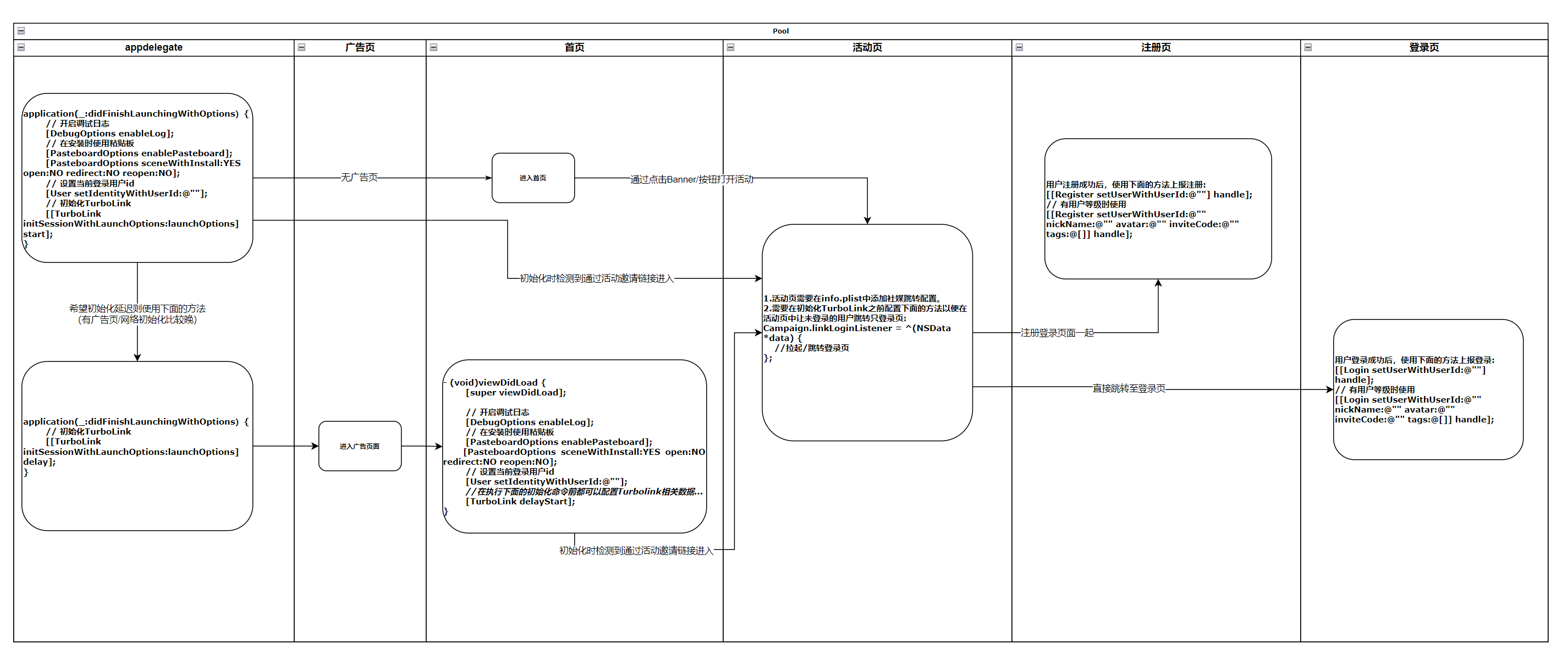⚠️
通过SDK集成的方式可以快速接入Turbolink iOS SDK的功能,如果你想要更手动的方式接入,可以选择API的接入方式。
SDK最小支持版本:iOS 12+
项目配置
为了顺利使用SDK,你需要在你的App项目中进行下述配置:
获取应用配置
添加info.plist配置
注:如果不想使用info.plist配置,可以直接在后面的步骤中使用代码配置
info.plist
<?xml version="1.0" encoding="UTF-8"?>
<plist version="1.0">
<dict>
<key>Turbolink Key</key>
<dict>
<key>App Key</key>
<string>你的项目AppKey</string>
<key>App Secret</key>
<string>你的项目AppSecret</string>
<key>Project</key>
<string>你的项目ProjectId</string>
</dict>
</dict>
</plist>SDK安装
可以从以下的方式中选择一种合适的方式来安装SDK到你的APP。
Swift Package Manager
- 在APP项目中的
Package Dependencies中点击”+“添加Swift Package。 - 输入以下的Package URL,点击添加。
https://github.com/Branchcn/TurboLinkFrameworkCocoaPods
- 在APP项目中的打开
podfile,如果还没有,请使用pod init创建。 - 在
podfile文件中TurboLinkSDK依赖。
target 'APP_NAME' do
use_frameworks!
pod 'TurboLinkSDK', '~>2.0' #默认使用静态库
# pod 'TurboLinkSDK/Dynamic', '~>2.0' 使用动态库
end- 执行命令
pod install && pod update完成依赖加载。
使用流程图
以AppDelegate为例,使用流程如下:

快速使用
请根据你的项目使用的UI场景选择对应的使用方式,按照以下方式接入SDK后,默认将会在App使用的时候自动上报安装和打开事件。(如果你希望app启动后到首页再进行初始化及上报操作,你可以使用延迟初始化的方式)
若使用Objective-C,请使用桥接模式。
注:请在网络授权之后初始化TurboLink,否则有可能因为没有网络授权而埋点上报失败
AppDelegate.m
#import "AppDelegate.h"
#import "TurboLinkSDK/TurboLinkSDK-Swift.h"
@interface AppDelegate ()
@end
@implementation AppDelegate
- (BOOL)application:(UIApplication *)application didFinishLaunchingWithOptions:(NSDictionary *)launchOptions {
// 如果用户已登录,开启应用时设置当前登录用户id
[User setIdentityWithUserId:@""];
[[TurboLink initSessionWithLaunchOptions:launchOptions] start];
return YES;
}
- (BOOL)application:(UIApplication *)app openURL:(NSURL *)url options:(NSDictionary<UIApplicationOpenURLOptionsKey,id> *)options {
[TurboLink applicationWithOpen:url];
return YES;
}
-(BOOL)application:(UIApplication *)application continueUserActivity:(NSUserActivity *)userActivity restorationHandler:(void (^)(NSArray<id<UIUserActivityRestoring>> * _Nullable))restorationHandler {
[TurboLink applicationWithContinue:userActivity];
return YES;
}
@end使用代码配置项目参数
除了使用Info.plist配置项目参数外,你也可以使用代码进行配置。注:如果两者皆配置了参数,代码优先级更高
[Project setConfigWithProjectId:@"" appKey:@"" appSecret:@""];延迟初始化的方式
如果你担心初始化放在application中会造成性能影响,可以使用延迟初始化的方式,把真正的初始化放到进入app之后(如进入首页)。
注:如果进入app有启动页/广告页,亦可以使用该方法规避活动页覆盖广告页显示问题。
#import "AppDelegate.h"
#import "TurboLinkSDK/TurboLinkSDK-Swift.h"
//AppDelegate.m
@implementation AppDelegate
- (BOOL)application:(UIApplication *)application didFinishLaunchingWithOptions:(NSDictionary *)launchOptions {
[[TurboLink initSessionWithLaunchOptions:launchOptions] delay];
return YES;
}
//Home.m
- (void)viewDidLoad {
[super viewDidLoad];
//配置Turbolink相关数据...
[TurboLink delayStart];
}调试日志
// 开启调试日志
[DebugOptions enableLog];粘贴板
// 开启粘贴板配置
[PasteboardOptions enablePasteboard];
// 当检测到地址或者口令时获取弹窗授权 不设置时默认地址和口令都使用
[PasteboardOptions filterWithUri:YES code:YES];
// 设置需要弹窗授权的时机 install:安装完第一次打开时 open:每一次打开app时 redirect:通过链接跳转进入app时 reopen:切换app进入时 不设置时默认均不开启
[PasteboardOptions sceneWithInstall:YES open:YES redirect:YES reopen:YES];用户管理
// 设置当前登录用户id
[User setIdentityWithUserId:@""];
// 当用户存在等级体系时添加用户等级信息
[User setUserWithUserId:@"" nickName:@"" avatar:@"" inviteCode:@"" tags:@[]];判断链接是否属于TurboLink
if ([TurboLink isUrlBelongTurboLinkWithUrl:@"https://xxx"]) {
}设置用户额外参数
这里设置的参数在用户中奖发奖时附加到API的请求包上。
NSMutableArray *cps = [[NSMutableArray alloc] init];
[cps addObject:[[CustomParams alloc] initWithKey:@"k1" value:@"v1"]];
[Campaign setCustomParamsWithParams:cps];